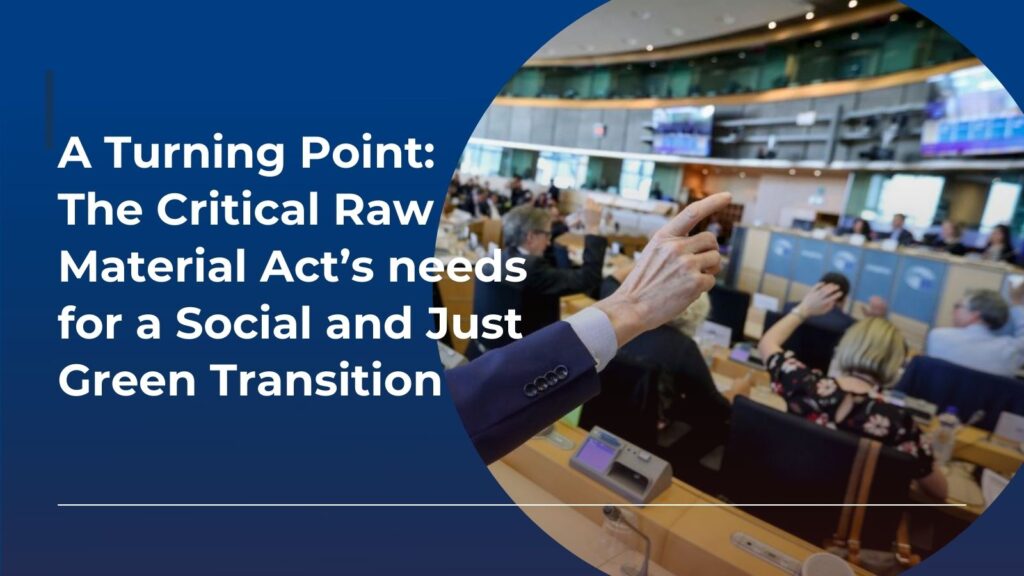
We support the position promoted by more than 40 civil society organisations, to demand that the Critical First Raw Material Act have a fair social and green transition.
The 21st century demands global efforts to address the multiple social and environmental crises that we are facing, which also negatively impacts the economy. Solutions exist, but demand political will (such as product ecodesign legislation or singular use product bans), and a political discourse to develop new tools (such as energy production limits) for transformative, equitable change that brings humanity comfortably back within planetary boundaries.
Most of the converging social and environmental crises we are facing are a result of the over-consumption of resources. This is driven by unsustainable production and consumption patterns in increasingly unequal societies, regardless of the level of development of any given country.
We present this Position Paper, by more than 40 civil society organisations, which delves into the main issues that arise within this context in regard to the Critical Raw Materials Act (CRMA) and provides key recommendations.
- The EU should actively reduce its dependence on primary raw materials and implement demand-side solutions to decrease critical raw materials consumption by at least 10% by 2030, including phasing out single-use products containing critical raw materials, implementing a material passport system, and adopting national programs to promote material efficiency and the use of alternative materials.
- The CRMA should not rely solely on certification schemes, as certification alone does not guarantee compliance with mandatory human rights and environmental regulations; instead, a broader assessment of human rights and environmental performance should be conducted. If certification schemes are used as one tool of many, they have to include certain criteria as minimum a multi-stakeholder governance, adherence to comprehensive standards, disclosure rules, accessible grievance mechanisms, and public audit reports.
- The CRMA’s focus on EU supply security through partnerships lacks a global justice approach. Including concrete measures to ensure sustainability standards, civil society participation, and the protection of human rights and the environment in third countries. Our recommendations include aligning partnerships with international agreements, implementing robust monitoring and remediation mechanisms, defining “value addition,” supporting domestic industrialisation, involving civil society and Indigenous Peoples, ensuring transparency, and avoiding the undermining of commitments through other regulations or trade agreements.
- The CRMA’s focus on accelerating permitting procedures for Strategic Projects risks bypassing environmental and social safeguards and lacks public buy-in. Streamlined permitting must not come at the cost of environmental protection, meaningful public participation. Incorporating elements like Free, Prior, and Informed Consent (FPIC) and Indigenous rights must be at the center of strategic projects. Additionally, resources to licensing authorities have to be allocated, international agreements referenced, transparency ensured and a subgroup on sustainability and responsible mining within the European Critical Raw Materials Board established. Deep-sea mining due to potential environmental and social impacts has to be prohibited.
- For the success of the European Green Deal and the EU’s strategic autonomy, it is crucial to prioritise a circular economy approach in the CRMA. This includes implementing an ambitious recycling strategy, enhancing coherence with the waste hierarchy, increasing EU recycling capacity targets, improving collection and separation of critical raw materials (CRM)-containing components, proposing recycled content targets for all CRM-containing products, incorporating measures for public procurement, and ensuring that the recovery of mining waste follows comprehensive regulations and includes plans for remediation of historical pollution.
- The CRMA should include comprehensive rules for calculating and verifying the environmental footprint of critical raw materials. This requires clear criteria for determining a significant environmental footprint, taking into account the impact on circularity and recycling, international standards, and sustainable practices, conducting prior assessments and consultations with relevant stakeholders, allowing the European Scientific Advisory Board on Climate Change to provide scientific advice, ensuring environmental footprint declarations for all critical raw materials placed on the market, including intermediate and final products, and the adoption of delegated acts to establish environmental footprint performance classes with specific parameters.

